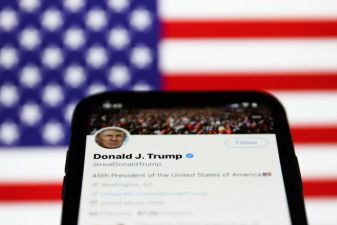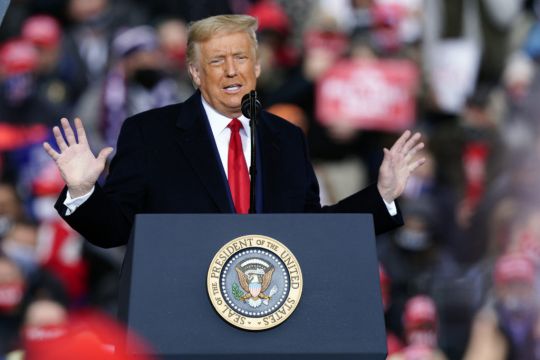Donald Trump routinely uses his Twitter account to divert attention away from topics that are potentially harmful to his reputation, according to a study.
The international research, led by the University of Bristol and published in Nature Communications, found the US president’s tweets resulted in reduced media coverage of the negative topic.
Professor Stephan Lewandowsky, of the University of Bristol, said: “Our analysis presents empirical evidence consistent with the theory that whenever the media report something threatening or politically uncomfortable for President Trump, his account increasingly tweets about unrelated topics representing his political strengths.
“This systematic diversion of attention away from a topic potentially damaging to him was shown to significantly reduce negative media coverage the next day.”
Diversionary tweets
Mr Trump is one of the most prolific users of social media among world leaders.
Since the beginning of his candidacy in 2015, approximately 30,000 tweets have been sent from his account.
The study focused on Mr Trump’s first two years in office, taking in the Robert Mueller investigation into potential collusion with Russia in the 2016 presidential election.
It analysed content relating to Russia and the Mueller investigation in two of the country’s media outlets, the New York Times and ABC World News Tonight.
Researchers selected a set of keywords from Mr Trump’s preferred topics at the time – “jobs”, “China” and “immigration” – which were hypothesised to be likely to appear in diversionary tweets.
The study suggested the more the New York Times and ABC World News Tonight reported on the Mueller investigation, the more Mr Trump’s tweets mentioned those keywords.
It’s unclear whether President Trump, or whoever is at the helm of his Twitter account, engages in such tactics intentionally or if it’s mere intuition
Results showed that every five additional ABC headlines relating to the Mueller investigation was associated with one more mention of a keyword in Mr Trump’s tweets.
Two additional mentions of one of the keywords in a tweet from the president was associated with roughly one less mention of the Mueller investigation in the following day’s New York Times.
Such a pattern did not emerge with placebo topics that presented no threat to Mr Trump, such as Brexit or other non-political issues such as football or gardening.
“It’s unclear whether President Trump, or whoever is at the helm of his Twitter account, engages in such tactics intentionally or if it’s mere intuition,” Prof Lewandowsky said.
“Either way, we hope these results serve as a helpful reminder to the media that they have the power to set the news agenda, focusing on the topics they deem most important, while perhaps not paying so much attention to the Twitter-sphere.”
The study also included an expanded analysis considering Mr Trump’s entire Twitter vocabulary as a potential source of diversion.

Analysis identified nearly 90 pairs of words that were more likely to appear in tweets when coverage of Russia and the Mueller investigation increased.
These word pairs largely represented Mr Trump’s political strengths, such as the economy.
The study – Using the president’s tweets to understand political diversion in the age of social media – is published in Nature Communications.







